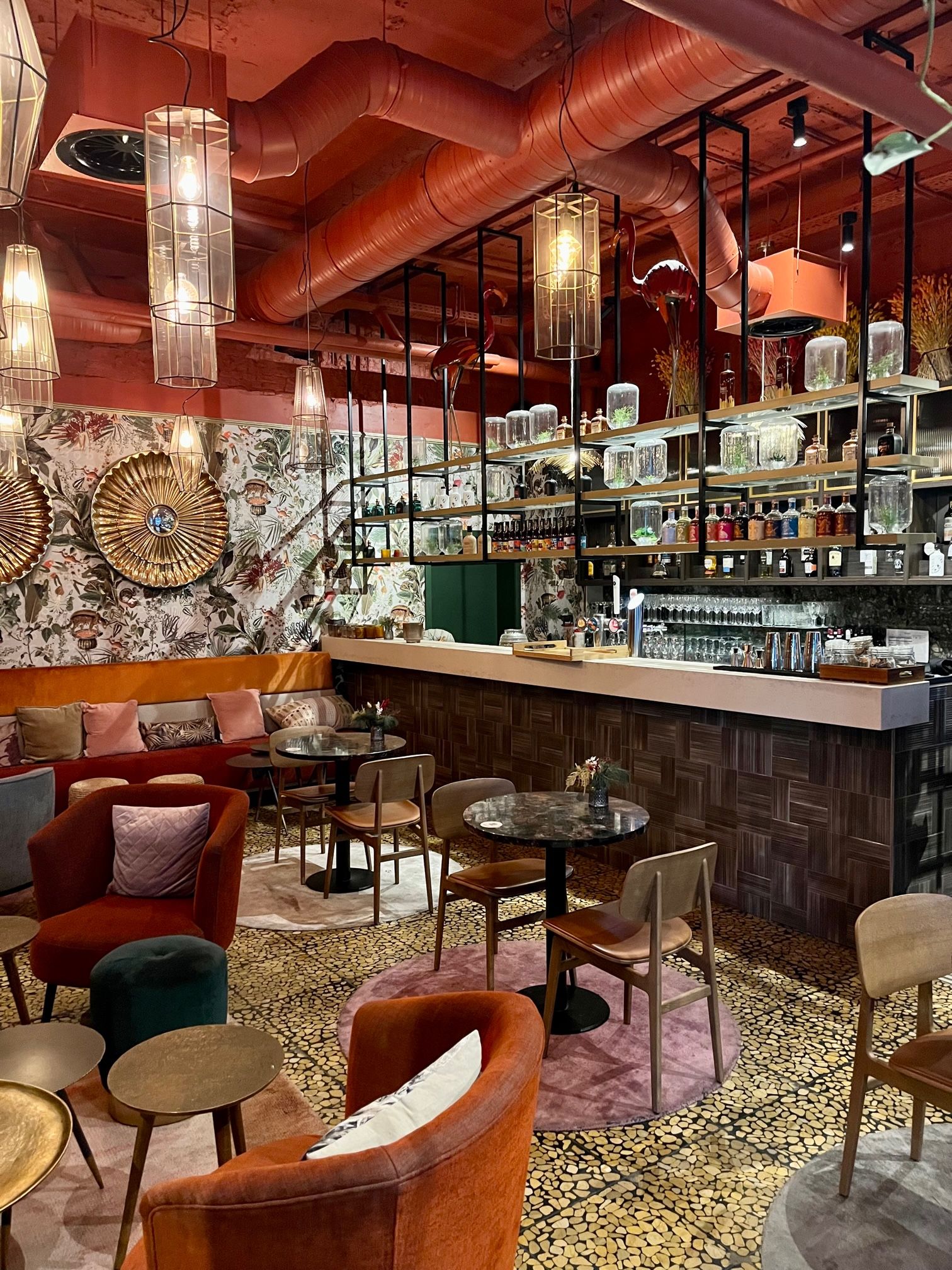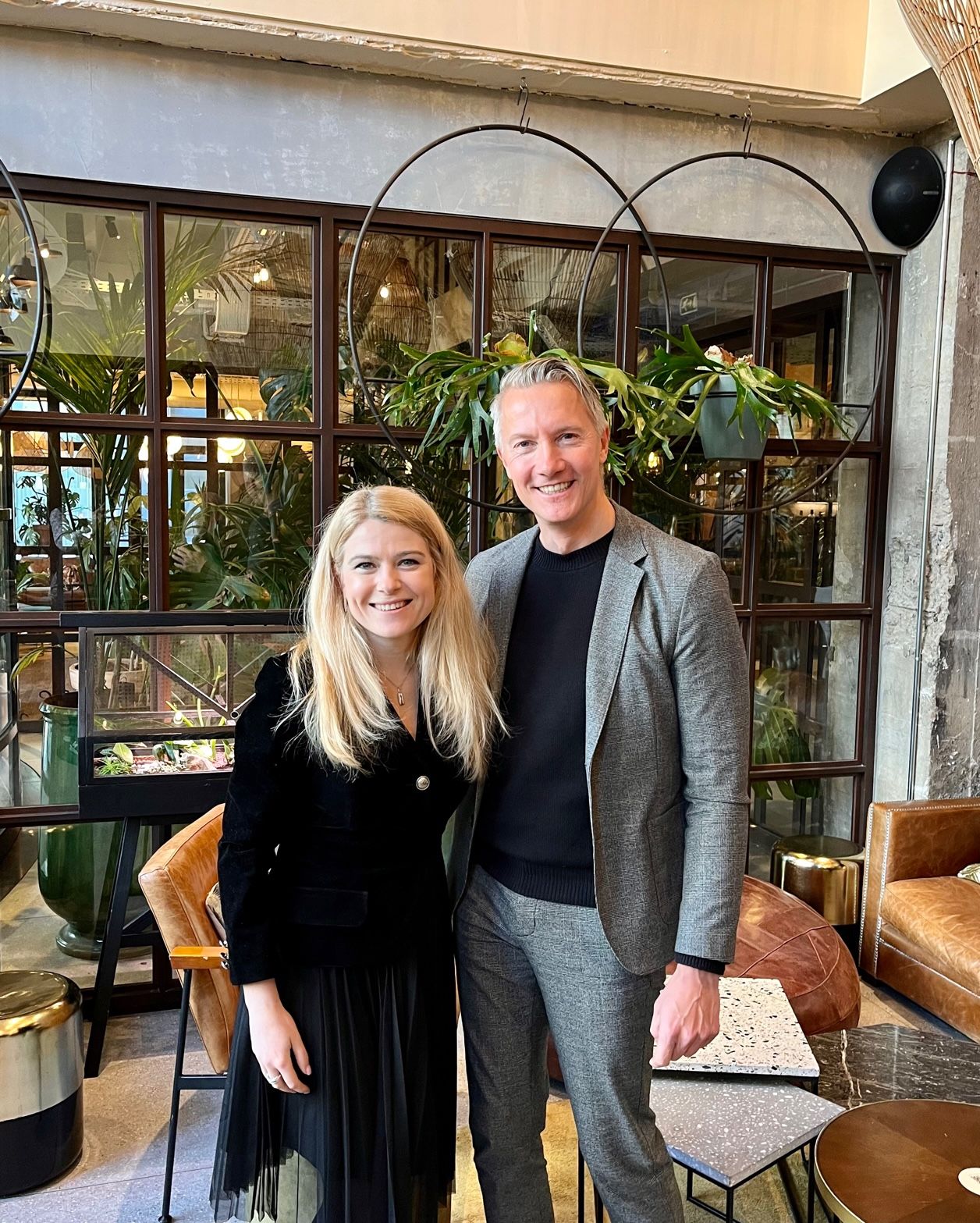Interview with Elena Drozd, General Manager of Indigo Hotel Brussels City

 In an exciting collaboration with Hoteliers.com, Independent Hotel Show Amsterdam has been on the hunt for unique personal stories and insights into what drives hoteliers to deliver top level performances every day.
In an exciting collaboration with Hoteliers.com, Independent Hotel Show Amsterdam has been on the hunt for unique personal stories and insights into what drives hoteliers to deliver top level performances every day.
Patrick Brand of Hoteliers.com met with Elena Drozd, General Manager of Hotel Indigo Brussels City, an upscale hotel right in the heart of the Belgian capital to hear about her extraordinary journey to the role.
In addition to having a successful career in high end hospitality, Elena has an inspiring story to tell as one of the millions of Ukrainians displaced by the war with Russia.
How have the last two years been for you?
After a great career internationally, I came back to Kyiv with the plan to settle down. As a General Manager in a boutique hotel in a hipster and creative area, I was having a good time. But while I was on holiday in Sri Lanka, Russia invaded Ukraine from Belarus making the situation in Kyiv very dangerous. It was "all in the air" but nobody expected it.
2021 had been excellent. Covid was behind us and because there were few restrictions in Ukraine so we could welcome lots of European guests. We heard reports in the news about threats of war but thought that with the dialogue and pressure from abroad a solution would come.
All flights were cancelled, and it was no longer possible to travel back, so I was stuck in Doha. It was a terrible time when I was managing the hotel in Kyiv from abroad and I was responsible for guests still staying at the hotel and staff who went missing.
Fortunately, some employees had not followed the news, so they came to the hotel. With the help of these brave colleagues, I was able to take care of everything from my laptop. What do you do in a situation like that? No one had any experience with something like this. Transport by car was the only means of transportation, but roads were closed and there were long traffic jams in western Ukraine.
The hotel was closed after a while, but we kept in touch with the staff to check they were safe and provided psychological support. It was important to be there for each other. Some staff were going into the army and others staying behind or fleeing the country. One of the worst moments of the war for me was having to stop paying out the salaries because the money in the bank account had run out. We had colleagues in the operation who had no savings and were hit hard by this. They lived from salary to salary and could not fall back on savings.
I ended up in Germany with the help of a friend, and from there I helped a number of refugees find jobs. After staying in several different places, I was able to stay in Hamburg, which I’m very grateful for.
It was a rollercoaster of emotions: some days you can't do anything, but because of the situation and feelings of guilt, you also develop a huge drive. The guilt comes from the fact that you are not in Ukraine fighting alongside your compatriots. Many people abroad feel this, this is the survival instinct. It’s important to find your mission in life again, when you have lost what you have built and have no foundation to lean on. My car is still in the same place in Kyiv where I left it for my holiday.
My mission is to continue my career as a hotelier, and I have received a lot of support from people in the industry. This is helping life return to some normality and has given me structure and distraction.
Every refugee has their own story and background. Every refugee initially wants to return home. Just because they are in Europe does not make a dream come true. When I got the contract as a General Manager for Hotel Indigo in Brussels, I cried for half a day. Not because I wasn't happy about it, but because I realised I wasn't going back home.
I want to say that we are deeply touched by all the reactions and actions of Europeans. People waited at the train station to take strangers home and include them in their family situations. I could cry about this kind of kindness in people. It’s the positive thing that has come out of this: you see people in a different way. The response was just amazing!
This job was a story of three handshakes, through WhatsApp I was introduced through a friend and from there it went fast, and they wanted me as GM. I’m grateful for this opportunity and the risk they took, because at the time I still didn’t have the right papers to work in Belgium. My team of 15 nationalities were very welcoming. It doesn't matter where you are from, we are all professionals. 
What is your background and how did you fall in love with hospitality?
I was born in the far east of Russia, near the Chinese border. As the daughter of a Russian mother and a father from Ukraine, my family soon moved to Ukraine where I grew up. My parents have an entrepreneurial mindset and are hard workers. I was the first person in the family to get the opportunity to study abroad and because I studied Japanese as a second degree, I managed to get a job at the Ukrainian pavilion at the World Expo when I was 20. That was my first experience within the hospitality industry!
After finishing my bachelor's at home, I left for my Master's at the Swiss Hotel Management School. It was the best time of my life! Living in Switzerland and studying, I loved it, it was so different from the theoretical studies in Ukraine. Getting practical experience gave me insight as well into what I wanted to do and how all departments work within an organization. During this period, I made friends for life and many students and teachers from that time also reached out to me when the war broke out.
How do you stand out from the crowd?
I can't represent a hotel I don't support or believe in. Our design is approachable and less business-oriented than the hotels around us in Brussels; our approach in F&B is also particular as it is plant-based. We integrate storytelling into our communication and by being informal and friendly, we try to become local friends to our guests. It is a very human approach to hospitality. My management style is democratic and equal. The young generation is more empowered, and it is easier for them to speak out and formulate their ideas. Pandox is a Swedish organization in which trust is very important. Everyone is very free to run their own hotel in their own way and you have a lot of independence. You get freedom but remain responsible for the results. The culture of Pandox is also about being very involved and genuine. Over Christmas, the management of Pandox bought 40 generators for Ukraine to generate electricity, because it had been a good year. This touched me deeply.
What is your most memorable or special moment with a guest, who stayed with you?
During the time I worked as Director of Sales in a boutique hotel in Kyiv, we often hosted football teams. We once had the Spanish football team in house that won the championship. The Prince of Brunei and his assistant were in the hotel during this time and the assistant had the smallest room in the hotel which I would not normally put VIPS in. I met this assistant in the elevator and when I asked, "how is the stay?", she was so enthusiastic and said, "my room window is in the alley behind the hotel above the bus with Spanish players and so I can take the best pictures!". Moral of the story is; never fill in the answer, before you have asked the question.
What do you do to get more direct guests?
The KPI we analyze is NET REVPAR and through this, we look not only at ADR but also at cost per channel. You can often use revenue management software for this. The goal is to generate more direct bookings because these have the best margin. We do a lot with social media and use Google Ads to get more visitors to our website. Loyalty is an important component at Internationally branded hotels that are part of a larger chain and fortunately, we have a successful program within IHG for this that generates direct bookings. We also try to do upselling when guests arrive to increase our NET REVPAR.
What do you predict for 2023?
We have budgeted ambitiously for 2023 (26% growth) and the business in the books looks good. 2022 was an excellent year and the leisure business did very well from April onwards. I am cautious with predictions because you don't know how things are going with the current world situation. We will start mapping costs more precisely such as electricity, inflation and increase in salary costs.
For this, we have rigged a green KPI with a model through which we want to have a positive impact on the environment as well as financially. Better deals with suppliers, so more negotiations. In HR, the focus in the coming year will be on retaining and further developing talent.
My only personal wish is for the war to finish. It doesn't look good now, but I have the hope something will change in Russia with a change of leadership.
Magic moments will continue in life. I believe in faith and what doesn't kill you makes you stronger. My motto is to collect moments, not things. I came with a suitcase from Sri Lanka, all I had was myself, my memories, and my education.
)

)
)
)
)
)
)

)
)
)
)
)
)
)
)
)
)
)
)
)
)
)
)
)
)
)
)
)